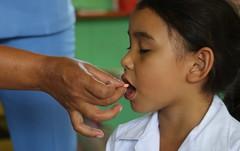
Credit: Pan American Health Organization/ World Health Organization official photo (CC BY 4.0)
Taenia solium–also called pork tapeworm–is a parasite which causes disease around the world, particularly in very poor communities with deficient santiation and where pigs roam free. Researchers have now analyzed the efficacy and adverse effects of three chemotherapeutics against T. solium and report their results in a review published in PLOS Neglected Tropical Diseases.
In its adult form, T. solium causes an intestinal infection known as taeniasis. Humans can become infected with taeniasis when they eat raw or undercooked, infected pork that contains T. solium larvae. A cysticerci form of disease can also develop when humans or pigs ingest the tapeworm eggs; this form can lead to muscle and central nervous system symptoms including seizures (epilepsy if they are recurrent). In endemic countries, T. solium can be responsible for approximately 30% of epilepsy cases. However, in specific communities this can be up to 70%.
In the new work, Michelle Haby of the University of Sonora, Mexico, and colleagues reviewed existing literature on three existing deworming drugs which have shown some efficacy in treating taeniasis. The drugs are albendazole (ALB), praziquantel (PZQ) and niclosamide (NICL). 20 studies met the inclusion criteria for the review; 11 used a before-after study design while 9 were controlled trials. The drug tested was ALB in 7 studies, NICL in 4 studies, PZQ in 7 studies, and a combination of PZQ and NICL in two studies.
Meta-analysis showed that a single dose of PZQ 10 mg/kg cured 99.5% of T. solium taeniasis; ALB 400 mg per day for three consecutive days led to a 96.4% cure rate; and NICL 2g led to a 84.3% cure rate. Less effective were PZQ 5mg/kg, with a 89.0% cure rate, and a single dose of ALB 400 mg, with a 52.0% cure rate. Most studies reported no or only mild and transient side effects following administration of the drugs.
The drugs “were effective as taenicides and could be considered for use in mass drug administration programs for the control of T. solium taeniasis,” the researchers say. “Future efficacy research should focus on the conduct of high quality randomized controlled trials of the three different drugs and varying doses, both in comparison to placebo and in head-to-head trials.”
###
Peer-reviewed Systematic review People
In your coverage please use this URL to provide access to the freely available paper: http://journals.
Citation: Haby MM, Sosa Leon LA, Luciañez A, Nicholls RS, Reveiz L, et al. (2020) Systematic review of the effectiveness of selected drugs for preventive chemotherapy for Taenia solium taeniasis. PLOS Neglected Tropical Diseases 14(1): e0007873. https:/
Image Credit: Pan American Health Organization/ World Health Organization official photo (CC BY 4.0)
Image Caption: Preventative chemotherapy for the control of soil-transmitted helminthiasis in the Americas region.
Funding: This review was funded by PAHO/WHO. The funders had no role in the study design, data collection or analysis, decision to publish, or preparation of the manuscript.
Competing Interests: The authors have declared that no competing interests exist.
Media Contact
PLOS NTDs
[email protected]
Related Journal Article
http://dx.




